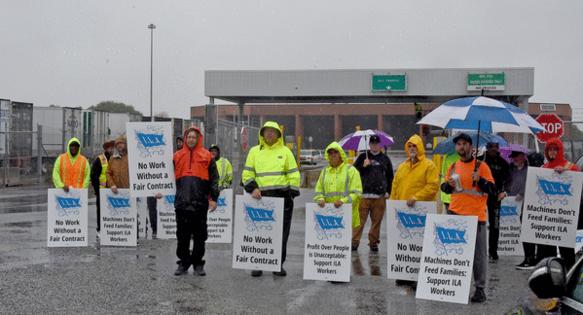Strike by longshoremen continues for second day along East Coast
Published in Business News
A longshoremen strike in the eastern U.S. continued for the second day Wednesday as the dockworkers union and port operators traded accusations of blame for the walkout.
Tens of thousands of longshoremen joined picket lines after midnight Tuesday after a labor contract expired, shutting down the Port of Baltimore and dozens of ports from Maine to Texas. Members of the International Longshoremen’s Association, fighting for better wages and protection from automation, rejected an offer by the U.S. Maritime Alliance to boost wages by 50% over six years.
The Maritime Alliance, which represents port employers like shipping lines and marine terminals, fired back with its first public comment since the walkout, saying it has done its part to end “the completely avoidable ILA strike.”
“Our current offer of a nearly 50% wage increase exceeds every other recent union settlement, while addressing inflation, and recognizing the ILA’s hard work to keep the global economy running,” the alliance said in a news release. “We look forward to hearing from the Union about how we can return to the table and actually bargain, which is the only way to reach a resolution.”
“Our current offer of a nearly 50% wage increase exceeds every other recent union settlement, while addressing inflation, and recognizing the ILA’s hard work to keep the global economy running,” the alliance said in a news release. “We look forward to hearing from the Union about how we can return to the table and actually bargain, which is the only way to reach a resolution.”
The ILA countered that the alliance last made a contract offer in February 2023, then waited until the eve of a potential strike to make another.
“USMX’s claim that they are ready to bargain rings hollow,” the ILA statement said.
The union said the offer fails to address demands of members, many of whom operate container handling equipment worth millions of dollars for $20 an hour when minimum wage is $15 in many states. And two-third of ILA members work on an on-call basis with no guaranteed employment if no ships are in port for loading or unloading, the ILA said.
“Our members endure a grueling six-year wage progression before they can even reach the top wage tier, regardless of how many hours they work or the effort they put in,” the union’s statement said.
The maritime alliance responded again late Wednesday, saying it will not agree to preconditions to return to bargaining but is focused on addressing “critical” issues.”
“Reaching an agreement will require negotiating — and our full focus is on how to return to the table to further discuss these vital components, many of which are intertwined,” the statement said.
The work stoppage is the first widespread longshoremen’s strike in almost five decades. Dockworkers in Baltimore, about 2,400 of whom are ILA members, are walking picket lines outside terminals such as Dundalk, Seagirt and South Locust Point.
The union argues that wage increases in the previous contract were wiped out by rising inflation, while ocean carriers, most of them foreign-owned, have made record profits.
The strike has led to a shutdown of Baltimore’s port for the second time this year. The port was largely closed for about two months after the container ship Dali struck the Francis Scott Key Bridge, collapsing the span into the Patapsco River, blocking the channel and killing six roadway workers.
It’s also expected to disrupt the economy, both locally and around the country, as the delivery of goods from overseas is delayed. Some economists expect costs to rise, rekindling inflation just as it seemed to be coming under control.
If the strike drags on, pressure would rise on the federal government to intervene, using powers under the Taft-Hartley Act, but such intervention seems unlikely for now.
In a statement on the strike, Acting U.S. Labor Secretary Julie Su criticized the shipping companies.
“As these companies make billions and their CEOs bring in millions of dollars in compensation per year, they have refused to put an offer on the table that reflects workers’ sacrifice and contributions to their employer’s profits,” Su said.
She also urged the ILA and the alliance to resolve their differences quickly.
“There is room for both companies and their workers to prosper,” Su said. “The parties need to get back to the negotiating table, and that must begin with these giant shipping magnates acknowledging that if they can make record profits, their workers should share in that economic success.”
A port shutdown in Baltimore could cause losses similar to those caused by the Key Bridge collapse and cost the state’s economy an estimated $15 million a day, said Daraius Irani, chief economist of Towson University’s Regional Economic Studies Institute.
“It would be a hit, and depending on how long it goes would determine how long it takes to recover,” Irani said. “The other challenge is, unlike when the bridge collapsed and the port was closed, there were alternatives,” for rerouting ships along the Eastern seaboard.
©2024 The Baltimore Sun. Visit at baltimoresun.com. Distributed by Tribune Content Agency, LLC.












Comments